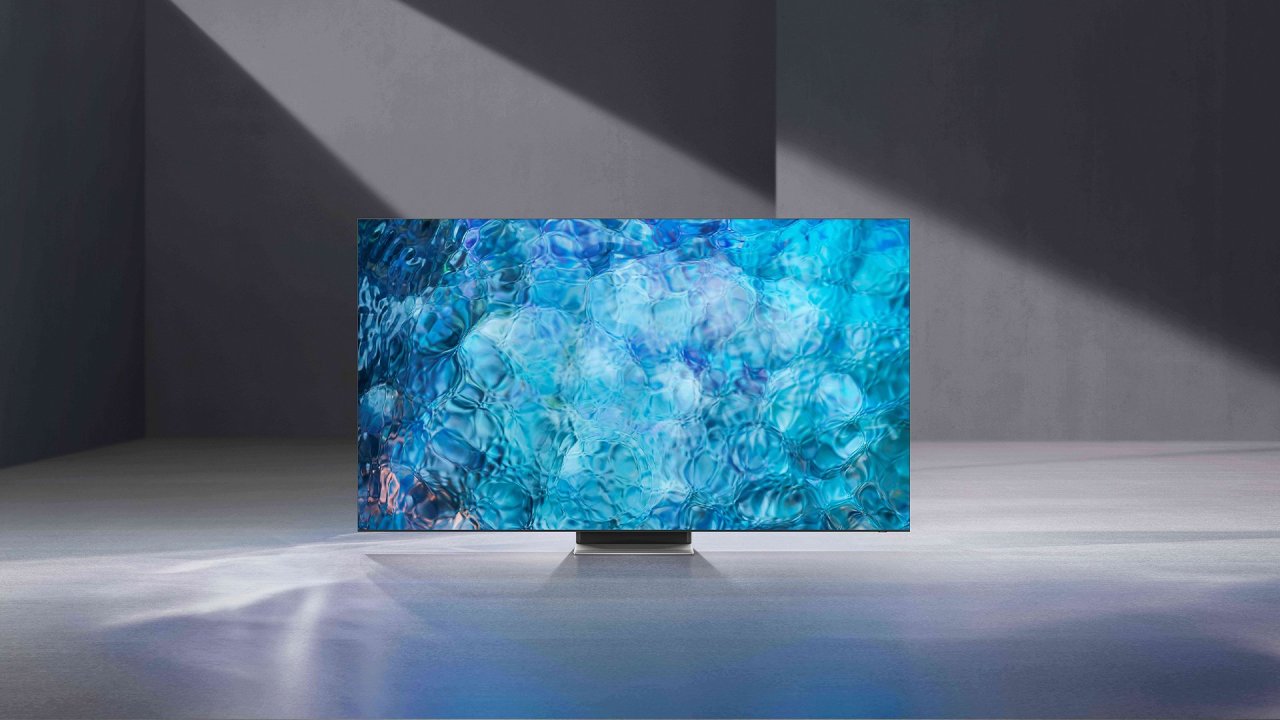[Market Eye] Will Samsung’s anti-OLED campaign end with imminent panel deal?
Samsung may work with archrival LG for OLED TV production
By Son Ji-hyoungPublished : Dec. 13, 2021 - 17:33

The market is closely watching Samsung Electronics’ possible move to diversify its panel supplier list amid circulating rumors that the South Korean tech giant is even mulling a deal with its archrival’s panel-making arm for large flat-screen televisions.
According to rumors and reports, Samsung is considering placing orders for white organic light-emitting diode panels from LG Display, with which it has locked horns for a long time over who has the technological edge, and that its announcement of clinching the deal is imminent.
This comes as Samsung tries to reduce its reliance on Chinese panel-making vendors such as BOE Technology and China Star Optoelectronics Technology, from which it imports about 70 percent of its panels, as well as its panel-making arm’s planned exit from liquid crystal display business by next year.
Rumor has it that Samsung, the largest TV maker in the world for over 15 straight years, is to buy about 2 million white OLED display panels from LG Display, in addition to 4 million LCD panels, for next year. The two are reportedly in the final stages of negotiating the price over OLED panels. Samsung Electronics and LG Display declined to comment on the matter.
The slow pace of mass production of Samsung’s quantum-dot OLED TV panel, a flat-panel technology Samsung Display plans to unveil in January that combines elements of OLED and quantum dot displays, is also making the case for the rumored deal.
The hybrid display technology uses OLED panels as a backlight, unlike the traditional OLED screens whose pixels emit light without a backlight.
The soon-to-be-launched technology differentiates from LG’s OLED TVs as the former uses a quantum dot color conversion layer instead of an OLED color filter, which market experts perceive to be more efficient in color representation. Samsung’s de facto leader Lee Jae-yong pledged in 2019 to spend a total of 13.1 trillion won ($11 billion) by 2025 to research, develop and commercialize quantum-dot OLED technologies.
But market watchers say that the projected production capacity of quantum-dot OLED panels -- reportedly up to 1 million units next year -- is not enough to keep up with the premium TV manufacturing capacity of Samsung, which sells nearly 50 million TV sets annually. Samsung Display’s quantum-dot OLED panel production line is taking the place of its LCD production line in Asan, South Chungcheong Province, amid declining LCD panel prices worldwide.
“Given the expected annual panel production capacity for 2022 at Samsung Display of only 1-milinano units, compared to LG Display’s 11-milinano units, we believe a strategic partnership between Samsung Electronics and LG Display to be a strong possibility,” wrote Jeff Kim, an analyst at KB Securities, referring to Samsung’s quantum-dot OLEDs and LG’s white OLEDs, respectively.
Kim added that Samsung is expected to increase panel orders from LG Display by more than five times next year.
If the deal is finalized, it would signal an end to decades of a tug-of-war between Samsung, a longtime anti-OLED campaigner, and LG, effectively a sole OLED panel supplier to the world’s large TV makers.
Samsung has long been deploying terms ranging from quantum-dot LED to micro LED and quantum-dot OLED to describe its original technologies premium flat screen TV lineup. So far, Samsung’s TVs have used panels with a quantum dot layer. For example, its flagship QLED uses traditional LCD panels lit by LEDs. Samsung has refrained from using the term OLED for its TV lineup, until the latest quantum-dot OLED technology started to materialize, aside from the fact that it is one of the leading players for OLED technologies for small screens.
In line with the fierce rivalry, which has involved a lawsuit over trade secret thefts, Samsung’s Han Jong-hee told a local media outlet that Samsung does not plan to buy LG’s OLED panels for premium TV sets in April. Han earlier this month was promoted to vice chairman and chief executive officer of Samsung Electronics’ new entity called “device experience” division, which oversees businesses ranging from consumer electronic goods to mobile handsets.
Still, there are doubts over whether Samsung could immediately produce its premium flat screen TV production with white OLED panels, should Samsung and LG joins hands with one another for OLED TV sets.
Nam Dae-jong, an analyst at eBest Investment & Securities, said the production of white OLED flat screen TV sets will come as early as the second half of next year.
“If the negotiation regarding OLED TV is still underway, Samsung is unlikely to add the OLED TV to its TV set lineup in the first half of 2022, while its focus on quantum dot nano-rod light emitting diode technology from 2024 denotes an early termination of white OLED panels in its TV set lineup,” Nam wrote.
According to rumors and reports, Samsung is considering placing orders for white organic light-emitting diode panels from LG Display, with which it has locked horns for a long time over who has the technological edge, and that its announcement of clinching the deal is imminent.
This comes as Samsung tries to reduce its reliance on Chinese panel-making vendors such as BOE Technology and China Star Optoelectronics Technology, from which it imports about 70 percent of its panels, as well as its panel-making arm’s planned exit from liquid crystal display business by next year.
Rumor has it that Samsung, the largest TV maker in the world for over 15 straight years, is to buy about 2 million white OLED display panels from LG Display, in addition to 4 million LCD panels, for next year. The two are reportedly in the final stages of negotiating the price over OLED panels. Samsung Electronics and LG Display declined to comment on the matter.
The slow pace of mass production of Samsung’s quantum-dot OLED TV panel, a flat-panel technology Samsung Display plans to unveil in January that combines elements of OLED and quantum dot displays, is also making the case for the rumored deal.
The hybrid display technology uses OLED panels as a backlight, unlike the traditional OLED screens whose pixels emit light without a backlight.
The soon-to-be-launched technology differentiates from LG’s OLED TVs as the former uses a quantum dot color conversion layer instead of an OLED color filter, which market experts perceive to be more efficient in color representation. Samsung’s de facto leader Lee Jae-yong pledged in 2019 to spend a total of 13.1 trillion won ($11 billion) by 2025 to research, develop and commercialize quantum-dot OLED technologies.
But market watchers say that the projected production capacity of quantum-dot OLED panels -- reportedly up to 1 million units next year -- is not enough to keep up with the premium TV manufacturing capacity of Samsung, which sells nearly 50 million TV sets annually. Samsung Display’s quantum-dot OLED panel production line is taking the place of its LCD production line in Asan, South Chungcheong Province, amid declining LCD panel prices worldwide.
“Given the expected annual panel production capacity for 2022 at Samsung Display of only 1-milinano units, compared to LG Display’s 11-milinano units, we believe a strategic partnership between Samsung Electronics and LG Display to be a strong possibility,” wrote Jeff Kim, an analyst at KB Securities, referring to Samsung’s quantum-dot OLEDs and LG’s white OLEDs, respectively.
Kim added that Samsung is expected to increase panel orders from LG Display by more than five times next year.
If the deal is finalized, it would signal an end to decades of a tug-of-war between Samsung, a longtime anti-OLED campaigner, and LG, effectively a sole OLED panel supplier to the world’s large TV makers.
Samsung has long been deploying terms ranging from quantum-dot LED to micro LED and quantum-dot OLED to describe its original technologies premium flat screen TV lineup. So far, Samsung’s TVs have used panels with a quantum dot layer. For example, its flagship QLED uses traditional LCD panels lit by LEDs. Samsung has refrained from using the term OLED for its TV lineup, until the latest quantum-dot OLED technology started to materialize, aside from the fact that it is one of the leading players for OLED technologies for small screens.
In line with the fierce rivalry, which has involved a lawsuit over trade secret thefts, Samsung’s Han Jong-hee told a local media outlet that Samsung does not plan to buy LG’s OLED panels for premium TV sets in April. Han earlier this month was promoted to vice chairman and chief executive officer of Samsung Electronics’ new entity called “device experience” division, which oversees businesses ranging from consumer electronic goods to mobile handsets.
Still, there are doubts over whether Samsung could immediately produce its premium flat screen TV production with white OLED panels, should Samsung and LG joins hands with one another for OLED TV sets.
Nam Dae-jong, an analyst at eBest Investment & Securities, said the production of white OLED flat screen TV sets will come as early as the second half of next year.
“If the negotiation regarding OLED TV is still underway, Samsung is unlikely to add the OLED TV to its TV set lineup in the first half of 2022, while its focus on quantum dot nano-rod light emitting diode technology from 2024 denotes an early termination of white OLED panels in its TV set lineup,” Nam wrote.




















